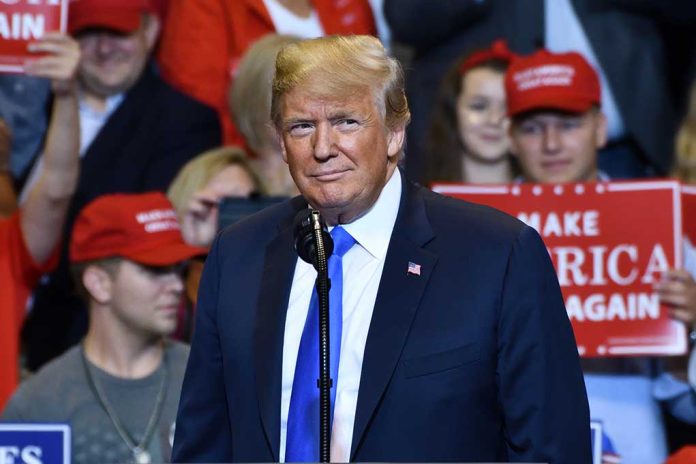
President Trump confronted South African President Cyril Ramaphosa with shocking video evidence of alleged violence against white farmers, leading to an unprecedented White House showdown over claims of “genocide” and land seizures.
Key Takeaways
- President Trump accused South Africa of orchestrating systematic killings of white Afrikaner farmers, playing video evidence in the Oval Office including footage of a far-left politician chanting “kill the farmer.”
- Trump has issued an executive order cutting all U.S. assistance to South Africa and has welcomed white South African farmers to America as refugees, citing protection from what he describes as “genocide.”
- President Ramaphosa firmly denied Trump’s accusations, stating “We are completely opposed to that, that is not government policy” while maintaining the visit was still successful for trade discussions.
- Experts in South Africa contend there is no evidence of whites being specifically targeted for their race, though violent crime affects farmers of all backgrounds across the country.
- The heated exchange has intensified debate about U.S. immigration policy regarding South Africans seeking asylum and highlighted significant divisions in understanding South Africa’s complex racial dynamics.
Historic Confrontation in the Oval Office
In an extraordinary diplomatic encounter, President Trump confronted South African President Cyril Ramaphosa directly over the alleged persecution of white Afrikaner farmers. The meeting, which began cordially, quickly shifted when Trump insisted on showing videos and newspaper articles he claimed documented systematic violence against white South Africans. Trump ordered the lights dimmed in the Oval Office, telling staffers to “Turn the lights down and just put this on,” before playing footage that included controversial South African political figures, including opposition leader Julius Malema singing an anti-apartheid era song with inflammatory lyrics.
The confrontation escalated as Trump presented what he described as overwhelming evidence of targeted killings. “We have thousands of stories talking about it,” Trump stated while presenting newspaper articles about killings in South Africa, particularly emphasizing deaths of white farmers. Trump’s assertion that “People are fleeing South Africa for their own safety. Their land is being confiscated and in many cases they’re being killed” stands in stark contrast to Ramaphosa’s firm denial of these claims.
Immigration Policy Shift and Aid Cuts
President Trump has taken decisive action following his assessment of the situation, issuing an executive order cutting all U.S. funding to South Africa. This significant policy shift comes alongside Trump’s decision to welcome white South African farmers to the United States as refugees, providing them protection from what he characterizes as state-sanctioned persecution. Trump claimed that both America and Australia are “being inundated with people that want to get out” of South Africa, suggesting a widespread exodus of the white minority population seeking safety abroad.
“You take a look at Australia, they’re being inundated and we’re being inundated with people that want to get out,” Donald Trump stated during the meeting with Ramaphosa, highlighting his administration’s commitment to providing asylum for those he believes are facing persecution. Trump further alleged that South Africa’s government was “taking people’s land away from them,” a claim that Ramaphosa immediately countered with a simple but firm “We have not.”
“People are fleeing South Africa for their own safety. Their land is being confiscated and in many cases they’re being killed” Said Donald Trump, President of the United States.
South Africa’s Fierce Denial
President Ramaphosa emphatically rejected Trump’s characterization of South Africa’s policies toward white farmers, insisting that the South African government does not condone or participate in any systematic persecution based on race. “We are completely opposed to that, that is not government policy and our government policy is completely, completely against what he was saying,” Ramaphosa stated, attempting to defuse tensions while maintaining his country’s sovereignty on domestic issues. Despite the confrontational nature of parts of the meeting, Ramaphosa later downplayed the exchange.
“We are completely opposed to that, that is not government policy and our government policy is completely, completely against what he was saying” Said Cyril Ramaphosa, President of South Africa
South African officials have consistently maintained that U.S. criticism is based on misinformation and fails to acknowledge the complex historical context of land ownership in post-apartheid South Africa. The South African government points to official statistics indicating that violence affects citizens of all races, with the black majority suffering disproportionately from crime. Ramaphosa’s delegation included prominent South African figures who attended the meeting to engage directly with President Trump and present their perspective on the nation’s racial dynamics and economic policies.
The Complex Reality of South African Violence
South Africa remains one of the most unequal societies globally, with significant economic disparities between racial groups persisting decades after the end of apartheid. This inequality provides crucial context for understanding the tensions surrounding land ownership and violence in rural areas. While Trump has characterized the situation as “Death, death, death, horrible death” targeting white farmers specifically, experts within South Africa maintain there is no evidence supporting claims that whites are being targeted specifically for their race, though violent crime affects farmers of all backgrounds throughout the country.
Despite the contentious nature of parts of their meeting, both leaders indicated some willingness to continue diplomatic engagement. Ramaphosa claimed the visit was ultimately successful for trade and investment discussions, telling reporters: “You wanted to see drama and something really big happening. And I’m sorry that we disappointed you somewhat when it comes to that.” For his part, President Trump remains focused on protecting those he sees as vulnerable to persecution, continuing his administration’s policy of providing refuge to South Africans fleeing what he considers dangerous conditions.



